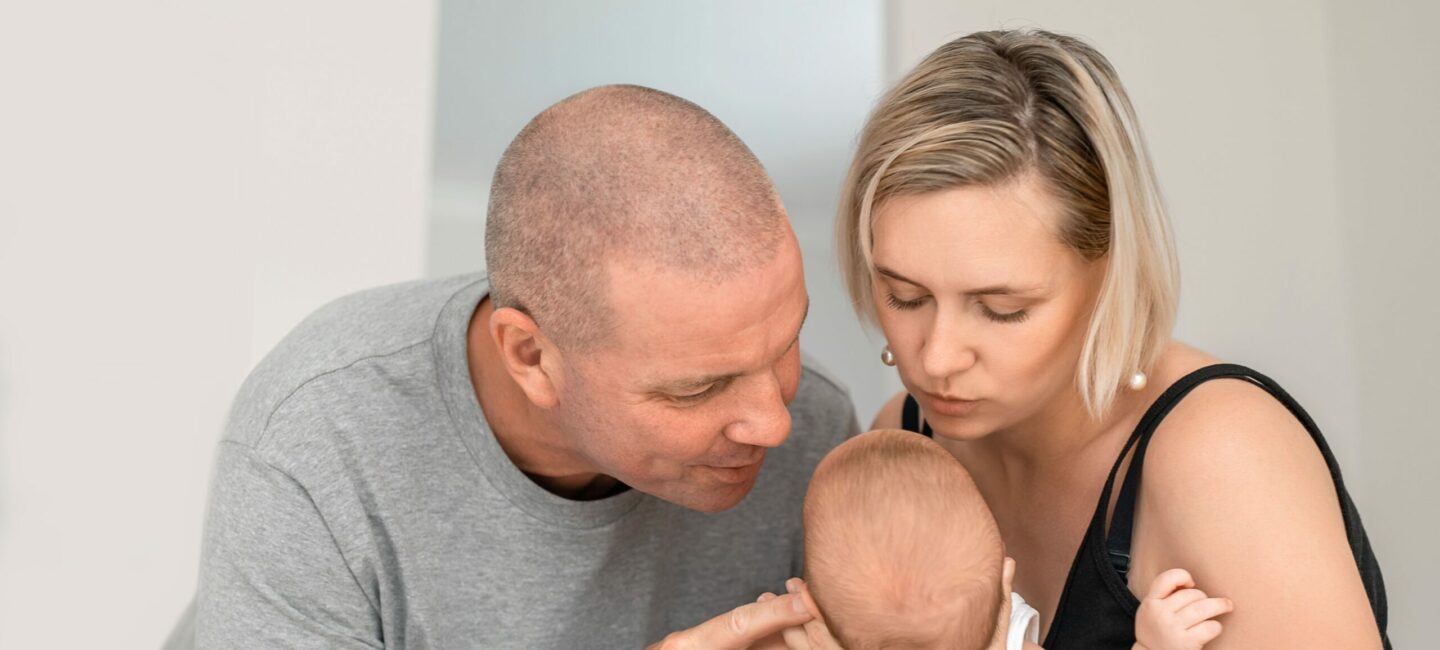
Taking a Bath After a Membrane Sweep: Precautions and Advice

In the 1940s, an Austrian researcher (Konrad Lorenz) developed a theory suggesting that a baby’s proportions automatically make them adorable: big round eyes, high eyebrows, chubby face, small nose and mouth… But sometimes, parents may find their baby a bit unattractive, awkward-looking, or let’s be honest—ugly.
Finding your baby ugly: let’s break the taboo and tell you everything.
Parents usually look forward to meeting their baby for the first time, gazing into each other’s eyes… But sometimes, when you first lay eyes on your newborn, you might notice something odd: an awkward feature, a misshapen or strange head, in short, something about their appearance feels off.
At least, that’s your first impression. It’s important to note that at birth, your baby is not necessarily at their peak cuteness! Here’s what might surprise you when you first meet them.
Right after birth, babies may be covered in a whitish cream. This is the vernix caseosa. It serves several functions, such as:
The closer the baby is to full term, the less vernix they’ll have. Don’t worry: the vernix will be absorbed by your baby’s skin within a few hours. So be prepared—your baby may not be all pink but rather covered in white at first!
If your baby is born vaginally, especially if instruments (such as a suction cup or forceps) were used to help with delivery, the passage through the pelvis may cause their head to be slightly misshapen, elongated, or bumpy. Don’t panic, the skull will round out in just a few hours!
It’s not uncommon for newborns, who built up fat and water reserves before birth, to arrive a bit swollen, much like a boxer after a tough fight. This swelling decreases quickly in the first few days.
Besides what we’ve already mentioned, your child won’t be at their cleanest on the day they’re born. They might still have remnants of their time in the womb on their skin or in their hair if they have any—substances like blood, amniotic fluid, clots, or meconium.
As you can see, on the day of their birth, your baby might not be looking their best, but this is completely normal and will soon resolve itself!
Meeting your baby is highly fantasized during pregnancy. Then it becomes reality. In this moment where fantasy meets reality, not all parents have the same experience. There may be a gap between how you imagined your baby and how they actually look. This is often referred to as the encounter between the real child and the imagined child, and it can bring surprises, or even disappointment if you find them “ugly.”
For example, you might have imagined they’d have their mother’s beautiful blue eyes or their grandfather’s straight nose, but instead they have their dad’s protruding ears. While it’s true that babies often resemble their parents, they won’t necessarily only have the features you imagined.
This gap we’ve just described can complicate your first meeting with your baby. You’ll need to let go of your expectations and accept moving away from the ideal you had imagined. So yes, it’s entirely possible to find your baby ugly and struggle to bond with them right away. And that’s okay. Bonding is something you build at your own pace.
Conclusion: don’t panic if you’re not blown away by their beauty. Give yourself time.
No, no, no, and no! As we’ve seen, finding your baby unattractive can happen. That doesn’t make you bad parents. There’s a myth suggesting that everything in parenting should be perfect, including how your baby looks.
But no, ambivalence (feeling torn between opposite emotions, like loving your child but finding them ugly) is a normal feeling. Having negative thoughts about your child’s appearance doesn’t make you a bad parent. No one expects you to fall in love at first sight. Becoming a parent is a new situation, one you need time to adjust to.
And remember, you are not the first person to feel this way. Don’t hesitate to talk about it, because making it a taboo only reinforces the belief that these thoughts are abnormal and shameful.
Granted, it’s not always easy to talk about it: society expects new parents to feel instant fulfillment and unconditional love. Not feeling this attachment right away can bring guilt, but you have nothing to be ashamed of.
And let’s take a step back on this good parent/bad parent idea… Your child doesn’t need a perfect parent. The pursuit of perfection is everywhere, making us suppress our “unacceptable” thoughts (like finding your baby ugly).
Don’t force yourself to be perfect. Instead, accept your negative thoughts, your frustrations… The goal is to stop fighting against them and to accept them until they pass.
Like all social relationships, the bond between a mother and child or father and child takes time to build. Parenting is a process, meaning it’s a journey, something built over time.
Want to learn more? Feel free to download the May app, where you’ll find plenty of resources to support and guide you throughout your journey as a new parent.
Let’s be honest: there’s no real manual for this. Finding your baby unattractive, accepting it, and gradually building a bond—there’s no magic formula except to stop feeling guilty and not hesitate to seek support.
Here are some tips to help you through it:
Talk to health professionals: midwives, pediatricians, pediatric nurses, psychologists… Lean on the professional who makes you feel safe and helps answer your questions—someone you’re not afraid to open up to.
On chat or via teleconsultation, don’t hesitate to contact our professionals who will offer a listening ear and advice to help you adjust to your new life as a parent.
Seek support from loved ones: don’t hesitate to ask for help or someone to talk to. Parents, friends, siblings, neighbors… Anyone willing to listen without judgment.
Read testimonies and books on the topic: as we said earlier, you’re not the first to find your baby unattractive. Look for stories in books about postpartum experiences, such as “Choisir d’être mère” by Renée Greusard, or on social media—stick to those that support you (and make you laugh).
Listen to podcasts like Bliss or Hello Mamas: same idea as before, but in podcast form. Hearing others voice these thoughts can help you speak up and feel less hesitant to express what you’re feeling.
Get some rest: parenting is exhausting. Lack of sleep affects your emotional and cognitive abilities, making everything seem worse. Don’t hesitate to leave your baby in the care of a trusted loved one or a nanny for a few hours if needed.
Talk to your baby: they won’t answer yet, but they’ll sense your intentions. You can explain what you’re feeling. You can cuddle them and talk about your struggles. All of this helps create your special bond and ease tension.
When you become a parent, it’s very common to face comments… some kind, some not. Everyone seems to have an opinion. Especially when it comes to appearance. Friends, family, acquaintances, or complete strangers… all these remarks can eventually get to you. Let’s take a closer look.
Yes, we’d love to say that parents are always united, but sometimes the co-parent doesn’t share your beauty standards. And that’s perfectly normal—you’re two different people. Each of you should try to express your feelings or disappointment and share them with the other parent.
Not easy, we admit. To feel heard and understood, open the conversation. Let your partner share their feelings, then share yours. The goal: to put your feelings into words and support each other as a couple.
Criticism from others can be particularly annoying and may increase your guilt and self-doubt. Sometimes it feels like you could explode! Few things are as sensitive as this topic… You can react in several ways:
➡️Explain your feelings: if you have the desire and energy, calmly tell the person that you don’t want to hear such remarks about your baby’s appearance because it hurts you, it’s offensive, and it’s not great for your baby either (who, even without understanding words, may feel the tension).
➡️Pretend to ignore it: sometimes you know a conversation is pointless or you just don’t have the energy to explain your feelings. You can pretend not to care or say nothing. This isn’t cowardice—some people are impossible to reason with, and ignoring them may help you get through the moment faster.
➡️Ask for mutual respect: similar to the first point, but here you emphasize respect. Would they like it if you criticized their looks? Probably not. Make them understand it’s the same for you—you don’t want to hear remarks about your child’s appearance.
➡️Recharge with kind people: why not take a break with kind friends or trusted family members?
➡️Don’t compare: every child is unique, especially in appearance. Comparing them only creates unnecessary rivalries or tensions.
➡️Use humor: it takes a bit of self-deprecation and confidence. A snarky comment about your “ugly” baby? Respond with humor, even exaggerate, like a modern-day Cyrano de Bergerac (“What a peak, what a crest!”). It will throw them off for sure.
Finding your baby ugly happens and it’s not a big deal. Let go of the guilt: a bond takes time to build, slowly but surely. Feeling unsettled is normal—don’t hesitate to seek support from loved ones or a professional.
Photo: marowl
This text was translated from French by an artificial intelligence. The information, advice, and sources it contains comply with French standards and may therefore not apply to your situation. Make sure to complement this reading by visiting the May US/UK app and consulting the healthcare professionals who are supporting you.
These resources might interest you

Taking a Bath After a Membrane Sweep: Precautions and Advice


Coloring your hair while pregnant: what precautions should you take?